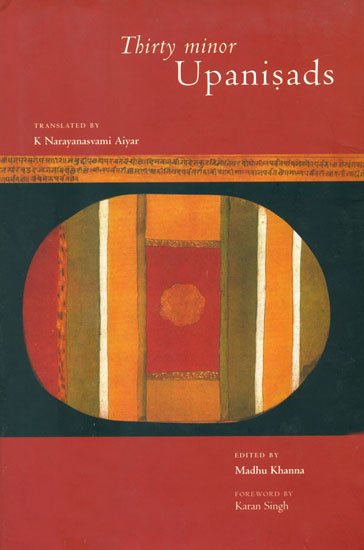Thirty minor Upanishads
by K. Narayanasvami Aiyar | 1914 | 95,228 words
This book contains the English translation of thirty minor Upanishads.—Fourteen belonging to Vedanta, two are categorised as Physiological, three are Mantra, two are Sannyasa and the remaining nine are categorised as Yoga-Upanishads. These Upanishads are properly defined as the Aranya-portion of the Vedas (most ancient Hindu scriptures) and are so-...
Narayana Upanishad of Krishna-Yajurveda
Om. Then Nārāyaṇa, the supreme Puruṣa desired. "I shall create offspring." From Nārāyaṇa emanates prāṇa, manas, the several organs of sense and action, ākāś, vāyu, agni, āpas and pṛthivī that supports all. From Nārāyaṇa emanates Brahmā. From Nārāyaṇa emanates Rudra. From Nārāyaṇa emanates Indra. From Nārāyaṇa emanates Prajāpati (the divine progenitor). From Nārāyaṇa emanates the twelve ādityas, rudras, vasus, and all the chandas (Vedas). From Nārāyaṇa only do (all these) proceed. Through Nārāyaṇa do (they) prosper. In Nārāyaṇa (they) are absorbed. The Ṛgveda teaches this.
Then Nārāyaṇa is eternal. Brahmā is Nārāyaṇa, Śiva is Nārāyaṇa, Indra is Nārāyaṇa, Kāla (time) is Nārāyaṇa, Dik (space) is Nārāyaṇa, the intermediate quarters also are Nārāyaṇa; that which is above is Nārāyaṇa, that which is below is Nārāyaṇa, that which is in and out is Nārāyaṇa, the whole universe which existed and will exist is Nārāyaṇa. Nārāyaṇa is the only one that is stainless, sinless, changeless, and unnameable, and that is pure and divine. There is no second. Whoever knows Him thus, becomes Viṣṇu Himself. The Yajurveda teaches this.
One should utter "Om" first, then "namaḥ," and then "Nārāyaṇāya." "Om" (is) a single syllable; "Namaḥ" contains two syllables: "Nārāyaṇāya" contains five syllables. This is the sentence known as the Aṣṭākṣara[1] of Nārāyaṇa. Whoever studies this Aṣṭākṣara of Nārāyaṇa and recites it constantly, attains full life and supremacy over men, enjoys the pleasures of royalty and becomes the master of all souls. He attains mokṣa; yea, he attains mokṣa. The Sāmaveda teaches this.
The Yogin having pronounced (the name of) Him who is complete bliss, who is Brahma-puruṣa and who is of the nature of Praṇava (Om)—a combination of A, U, and M—is released from the bondage of birth and mundane existence. He who practises the mantra "Om-Namo-Nārāyaṇāya" reaches Vaikuṇṭha (the abode of Viṣṇu). It is this lotus (heart). It is replete with vijñāna: It has the brilliancy of lightning. The son of Devākī is Brahmaṇya[2]. Madhusūdana is Brahmaṇya. Nārāyaṇa who pervades all elements, who is one only, who is the cause Puruṣa and who is causeless, is known as Parabrahman. The Atharvaṇa Upaniṣad teaches this.
Whoever recites (this Upaniṣad) in the morning destroys the sins committed the night (before). Whoever recites it in the evening destroys the sins committed during the day. Whoever recites morning and evening becomes free from sins, however sinful he may be. Whoever recites (it) in the noon facing the sun is freed from all the five[3] great sins as well as from the minor ones. He derives the good effects of the recitation of all the Vedas. Whoever knows thus attains Sāyujya of Nārāyaṇa (viz., is absorbed in the essence of Nārāyaṇa). He attains Sāyujya of Nārāyaṇa. Thus is the Upaniṣad.
Footnotes and references:
[1]:
The eight syllables.
